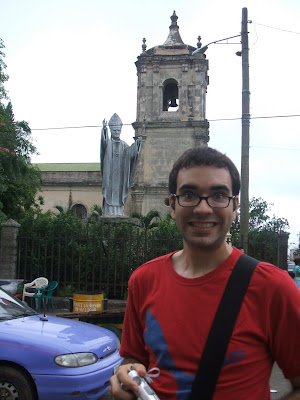Getting around
>> Thursday, May 31, 2007
If you need to travel within the city there are a couple of options: first is by foot. It’s cheap and for most people reliable but slow. The next step up is a guy on a bicycle with seats on the front pushing you around. Also slow. After that there are moto taxis… they’re sort of half motorcycle and half car but they’re not really good if you need to go outside the city. Then there are real taxis. In my city the taxis are all a flat rate no matter where you need to go, but in Managua you have to haggle and explain that yes you’re a gringo but no you’re not going to pay $50 to go 2 miles.
If you need to go to another city, you could go in a taxi but they’re pretty expensive for traveling long distances and we’re not allowed to own/drive cars and even look at motorcycles so the only real choice we have is to take the buses. There are basically two kinds of buses… there are retired school buses from the US (some still say “Jefferson County School District” on the sides and others are painted bright green with chrome wheels) and there are microbuses that are more like vans than buses. I haven’t been brave enough to take a big bus, but I think we’ll get the experience that this weekend when we go to visit another volunteer.
So far we’ve stuck to the microbuses for traveling between our cities and to Managua. In my city it’s usually really easy to catch a bus… you just walk to the park that’s a couple of blocks away and there are usually three or four competing microbus cobradors yelling “Managua Managua Managua” which comes out sounding much more like “manoamanoamanoa” than actual words, but they definitely get their point across. The cobrodors aren’t the drivers… they’re just guys who get passengers onto the bus and who take your money. They’re more or less bus pimps, and they can be really aggressive in their marketing techniques. If you walk up to a terminal you will usually have to pass by several buses going places that you don’t want/need to go to before you get to the bus you want, but the cobradors do not care. They will take you by the shoulder and try to guide you onto their bus, like even though you need to go to a meeting in Granada, Matagalpa does sound awfully nice so you’ll just change your mind after the suggestion of a nice cobrador.
Once you find the right microbus you aren’t really done. Very few people have their own cars, so everything they need to carry comes on the bus with them. The bigger buses have roosters, dogs, and whatever on them, but I haven’t had to share my seat with any farm animals yet. Usually it’s furniture, a huge basket of wares that weren’t sold at the market, or for Mother´s Day yesterday there were a bunch of people with gigantic flower arrangements on the buses. The buses technically have a maximum capacity, but I’ve never seen a bus refuse a passenger. If necessary the cobrador will hang half his body out the window in order to accommodate another person. The buses slow down on the side of the highway to let someone on but they never really stop. Once you get to the destination terminal you really just start the whole process of cobradors courting you over again. Managuamanaguamanagua.
This is a pretty typcial microbus:
The rest of these pictures don´t really have anything to do with transportation. Sorry for the theme shift.
This is the high school where I am working:
This is the Catholic church in my city:
This is the (much nicer) church in a nearby city:









1 comments:
Dr. Quinn made it sound like the amount you pay for a cab is inversely proportional to your skill at speaking the language, so maybe the price will go down the longer you're there.
If one of those cabs comes to Kirksville, you could come visit for a day. :)
Later,
Keith
Post a Comment